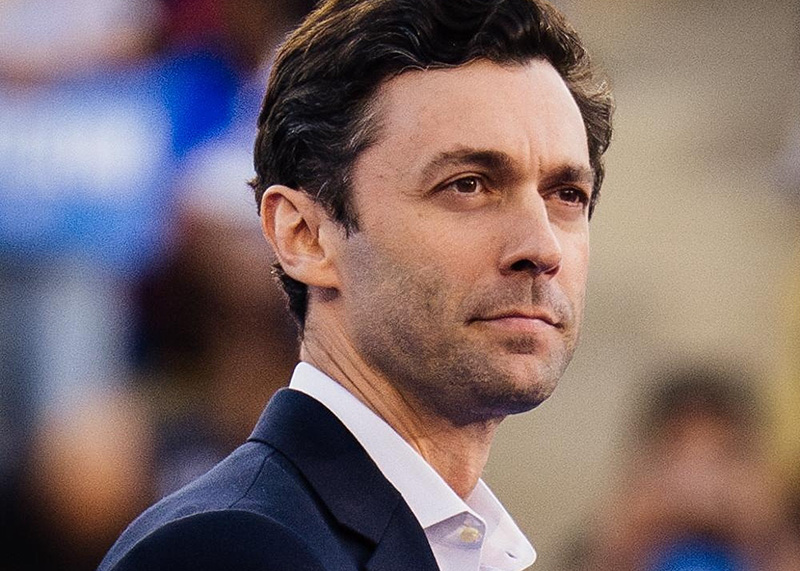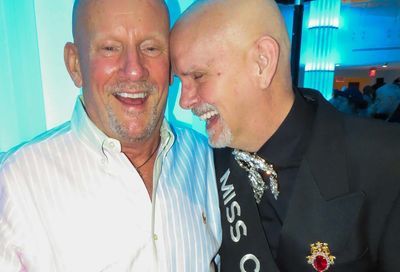“I don’t want to be a distraction”: Ruby Corado hands reins of Casa Ruby over to Alexis Blackmon
Incoming executive director wants to focus on achieving economic stability for the LGBTQ community center's clients.
By John Riley on October 1, 2021 @JRileyMW

On Friday, Ruby Corado, a longtime D.C. activist, stepped down as executive director of the LGBTQ nonprofit Casa Ruby. Corado is handing the reins to the organization she founded over to Interim Executive Director Alexis Blackmon, who previously served as the community center’s director of government affairs.
In a Facebook Live broadcast, Corado lamented the recent loss of funding from the D.C. Department of Human Services, which informed Casa Ruby last week — just days before the start of the new fiscal year on Oct. 1 — that it would not be renewing a nearly $840,000 grant to pay for low-barrier housing, which serves as temporary shelter for homeless LGBTQ youth.
Casa Ruby has since launched a GoFundMe page to help keep its low-barrier shelter options operational, as well as its 24-hour drop-in center, which is housed in the same Northwest D.C. building. The organization has also begun to move some of its clients to its other properties in an effort to avoid as many disruptions in services as possible.
Casa Ruby’s other programs, including its HIV prevention, mental health, legal, and immigrant services, as well as its transitional housing and its short-term living program, will remain operational, as they were unaffected by the DHS low-barrier grant. Corado recently told Metro Weekly, other grants from the District government for other programs were renewed, without incident.
During the Facebook live broadcast, Corado expressed frustration at her dealings with DHS, noting that the agency had previously attempted to cut the amount of the grant by nearly half, initially claiming that Casa Ruby had not complied with the terms of the grant agreement, and — when the organization’s lawyers rebutted that charge — requesting that Casa Ruby agree to amend the terms of the agreement retroactively. She also said DHS kept introducing new requirements that she and her staff had to meet.
“[DHS] came up with some unrealistic things, like they were asking for a license for the properties, even though we were on a month-to-month, and they’re like, ‘They need to be renewed, and you have 24 hours to get this.’ They asked for a certificate of occupancy when they have never asked for those things in the last seven years,” Corado said.
Corado also said that she felt some of the requirements were imposed in “retaliation” for various actions, including Casa Ruby’s refusal to amend the contract; its refusal to build a shelter for LGBTQ youth on Division Street NE, a neighborhood that Corado says can be dangerous for transgender youth; and for filing an administrative complaint against a DHS employee overseeing the grant money, who Casa Ruby, through its lawyers, has accused of misgendering, insulting, and discriminating against it because its leadership team is comprised of transgender individuals.
A DHS spokesperson did not respond to an inquiry seeking comment about Corado’s claims of retaliation.
Corado also claimed that the Bowser administration, specifically the Office of LGBTQ Affairs, failed to intercede on Casa Ruby’s behalf when it began encountering problems with DHS over the past three years, and especially after the organization complained of possible discrimination.
“We had a new administration whose first promise was to do jobs for the trans community,” Corado said. “We believed — and we all got sucked in on it — they were supportive. We gave all of this support at a time that this person was running against a gay man.”
But Corado added that she felt her presence as the executive director of Casa Ruby was serving as a “distraction” allowing her personal detractors — both in and out of government — to justify their animus toward Casa Ruby and ignore the impact that the loss of crucial funding would have on its clients in need of services. She also noted she is taking a three-month sabbatical, during which she plans to develop a private fundraising program to ensure Casa Ruby is not overly reliant upon government funding.
Related: Ruby Corado steps down as head of Casa Ruby
“I am moving [on] because I don’t want to be a distraction,” she said. “I’m not going to be the main target anymore. What I want to ask of all of you who will listen to this video is that it’s time to support the Black trans leadership of Casa Ruby.”
Corado called on supporters of Casa Ruby to lend their support to Blackmon in carrying out Casa Ruby’s mission, and expressed confidence that her successor would be a good steward of the organization.
“This is not about Ruby Corado,” she said. “This is about the people. This is about the people who lost their jobs…. This is about the unemployment in Washington, D.C. This is the homelessness in Washington, D.C. This is about the suicide rate. This is about the HIV, the hate crimes that highly impact trans and queer people of color.”
Blackmon, who also appeared on the live broadcast, said she was grateful to follow in Corado’s footsteps.
“I want to let everyone know that I am a product of what Casa Ruby is. There was time that I was out in survival mode and living a survival type of lifestyle, and there are times that I was not able to completely survive on my own. I want people to understand that it is extremely important for trans women to feel like they have some support system or some type of [feeling of] comfortability where they can be themselves. And this place has always offered that to my community and to myself,” Blackmon said.
“It is extremely important that we have a space that is led by people like us, like-minded individuals, because it no matter how you say it, if you haven’t walked in my shoes, you won’t know how they feel,” she added.

Blackmon pledged to fight for additional funding for Casa Ruby’s various programs, noting that she was part of an LGBTQ-led coalition that successfully influenced the D.C. Council to appropriate additional money to better address the LGBTQ community’s needs.
“We’re going to see what happens as far as how we can best utilize that money throughout the District, for our community, and trying to make sure that some people of Black and Brown experience receive some of that money, so that some of the people who actually fought for that money and brought those ideas to the table can actually benefit from those ideas,” she said.
Blackmon, a second-generation Washingtonian and graduate of UDC with experience working in D.C. government, has long been a proponent of a workforce program for transgender individuals, noting that financial stability is essential to improving a person’s situation.
“My goal is to continue on with the mission stating that the government must do better by us, but to define it a little bit more, I believe that trans people, especially trans people of color, deserve economic equality as well as stability,” Blackmon said. “People need homes, they need jobs, education, good health, good mental health so that they can live an upbeat life and help to uplift and pull others in. So it is my mission to come in and remove the focus from Ruby Corado and put it back on the mission of Casa Ruby.
“I want to make sure that is extremely clear that the mission of Casa Ruby is going to be to continue to make economic stability an option for everybody in the LGBTQ community,” she added. “I want us to become self-sufficient. I want people to understand that when you become complacent, when people are giving you crumbs, then you become comfortable. If you become comfortable with just receiving crumbs, eventually you will get killed. So complacency causes comfortability. Comfortability causes death. We have to remain uncomfortable.
See also: Ruby Corado’s Essential Service: “I protect people, especially those inside Casa Ruby”
“We have to make sure that people understand that we’re not going to go away without a fight,” she concluded. “We want you to understand who is truly hurt by this: these children, whose parents were kicking them out in their teens, they have nowhere to go, who don’t have food to eat. These these are the people that are truly impacted. And that is where the focus of Casa Ruby for fiscal year 2022 will be going, into making sure that we bring the economic standing up for the trans and the LGBTQ community.”
Speaking with Metro Weekly, Blackmon said she’s nervous but optimistic, believing this moment provides an opportunity to shine a light on the work that Casa Ruby does and the issues impacting the local community. She said she’ll focus on ways to raise money, and will continue to apply for different grants to help keep Casa Ruby’s various programs solvent. She hopes that she will be able to repair the organization’s relationship with DHS.
“I have been reaching out to them my best, trying to formulate the best relationship or foster the best relationship with them moving forward,” she said. “Now, sometimes the damage is done and cannot repaired. But it’s my job to reach out to the department and try to foster that relationship with them.”
She also said she intends to reach out to regular donors to Casa Ruby and hold various fundraising events to supplement the funding lost when DHS chose not to renew the grant. Besides financial support, she also urges supporters and community members to take a proactive role in the political process and hold local decision-makers accountable.
“I would like to see that the community write to their local councilmembers, the mayor’s office, her chief of staff, the director of the Department of Human Services,” Blackmon said. “Make phone calls, send emails, let the people in power know that we’re unsatisfied with the decisions they’ve made. Let the people know that the people who are going to be mostly hurt by this are going to be the clients and the employees that had to be let go.”
See also:
Becca Balint Introduces Trans Health Care Bill
Balint's bill would educate medical providers about how to provide gender-affirming care to transgender patients.
By John Riley on April 1, 2025 @JRileyMW
U.S. Rep. Becca Balint has introduced a bill to protect and expand access to gender-affirming care for transgender individuals at a time when the Trump administration is seeking to restrict the practice.
The Vermont Democrat's bill -- the Transgender Health Care Access Act -- establishes grants to support medical education programs and professional training in transition-related care, and to expand access to such services in rural communities.
She introduced the bill on March 31, coinciding with Transgender Day of Visibility.
The congresswoman noted in a news release that in a survey of students at 10 medical schools, nearly 4 in 5 students did not feel competent at treating transgender patients suffering from gender dysphoria.
Feminine Hygiene Grant Revoked Over Mention of Trans Men
A $600,000 USDA grant funding a study to create non-toxic menstrual hygiene products was revoked for acknowledging transgender identity.
By John Riley on March 16, 2025 @JRileyMW
A grant helping to fund a study on the potential health risks posed by synthetic menstrual hygiene products was revoked after being flagged for including transgender men.
The $600,000 grant, "Farm to Feminine Hygiene: Enhancing the Textiles Lab for Research, Extension, and Scientific Instrumentation for Teaching at Southern University," was awarded by the U.S. Department of Agriculture's National Institute of Food and Agriculture in 2024.
It sought to "address the growing concerns and issues surrounding menstruation, including the potential health risks posed to users of synthetic feminine hygiene products," according to the project's documentation, which was publicly filed on the USDA website.
WATCH: Ad Attacks Senator Over Trans Athlete Vote
A Republican super PAC is attacking U.S. Sen. Jon Ossoff for refusing to support a bill to enshrine a transgender sports ban into law.
By John Riley on April 8, 2025 @JRileyMW
The Republican Senate Leadership Fund is spending over a million dollars to air an ad attacking Sen. Jon Osssoff (D-Ga.) over the issue of transgender participation in sports.
The conservative super PAC's ad highlights the senator's opposition to the "Fair and Safe Athletic Opportunities Act," a congressional bill seeking to enshrine into law a ban that would prohibit transgender athletes from competing on female-designated sports teams.
The bill sought to amend Title IX, a federal law prohibiting sex discrimination in government-funded schools, to explicitly prohibit schools from allowing transgender women and girls to compete as females.
Support Metro Weekly’s Journalism
These are challenging times for news organizations. And yet it’s crucial we stay active and provide vital resources and information to both our local readers and the world. So won’t you please take a moment and consider supporting Metro Weekly with a membership? For as little as $5 a month, you can help ensure Metro Weekly magazine and MetroWeekly.com remain free, viable resources as we provide the best, most diverse, culturally-resonant LGBTQ coverage in both the D.C. region and around the world. Memberships come with exclusive perks and discounts, your own personal digital delivery of each week’s magazine (and an archive), access to our Member's Lounge when it launches this fall, and exclusive members-only items like Metro Weekly Membership Mugs and Tote Bags! Check out all our membership levels here and please join us today!
The Magazine
-
Most Popular
 Gay Army Reserve Officer in Uniform Sex Video Scandal
Gay Army Reserve Officer in Uniform Sex Video Scandal  MISTR's Free DoxyPEP Leads to Huge Drop in STI Rates
MISTR's Free DoxyPEP Leads to Huge Drop in STI Rates  A Potent (and Pricey) 'Good Night, And Good Luck'
A Potent (and Pricey) 'Good Night, And Good Luck'  Signature Honors Mandy Patinkin in Emotional Celebration
Signature Honors Mandy Patinkin in Emotional Celebration  'Gray Pride' Protests Hungary's Ban on Gay Pride Marches
'Gray Pride' Protests Hungary's Ban on Gay Pride Marches  Sarah Snook is Astonishing in Broadway's 'Dorian Gray'
Sarah Snook is Astonishing in Broadway's 'Dorian Gray'  Jared Polis Signs Law Repealing Colorado's Gay Marriage Ban
Jared Polis Signs Law Repealing Colorado's Gay Marriage Ban  Becca Balint: The Pride of Vermont
Becca Balint: The Pride of Vermont  Hugh Bonneville Delivers a Show-Stopping Vanya
Hugh Bonneville Delivers a Show-Stopping Vanya  White House Demands NIH Study Transgender Transition "Regret"
White House Demands NIH Study Transgender Transition "Regret"
 Becca Balint: The Pride of Vermont
Becca Balint: The Pride of Vermont  Signature Honors Mandy Patinkin in Emotional Celebration
Signature Honors Mandy Patinkin in Emotional Celebration  MISTR's Free DoxyPEP Leads to Huge Drop in STI Rates
MISTR's Free DoxyPEP Leads to Huge Drop in STI Rates  A Potent (and Pricey) 'Good Night, And Good Luck'
A Potent (and Pricey) 'Good Night, And Good Luck'  Sarah Snook is Astonishing in Broadway's 'Dorian Gray'
Sarah Snook is Astonishing in Broadway's 'Dorian Gray'  'Gray Pride' Protests Hungary's Ban on Gay Pride Marches
'Gray Pride' Protests Hungary's Ban on Gay Pride Marches  Jared Polis Signs Law Repealing Colorado's Gay Marriage Ban
Jared Polis Signs Law Repealing Colorado's Gay Marriage Ban  White House Ignores Reporters with Pronouns in Email Signatures
White House Ignores Reporters with Pronouns in Email Signatures  White House Demands NIH Study Transgender Transition "Regret"
White House Demands NIH Study Transgender Transition "Regret"  Air Force Reverses Ban on Pronouns in Email Signatures
Air Force Reverses Ban on Pronouns in Email Signatures
Scene
Metro Weekly
Washington's LGBTQ Magazine
P.O. Box 11559
Washington, DC 20008 (202) 638-6830
About Us pageFollow Us:
· Facebook
· Twitter
· Flipboard
· YouTube
· Instagram
· RSS News | RSS SceneArchives
Copyright ©2024 Jansi LLC.











You must be logged in to post a comment.